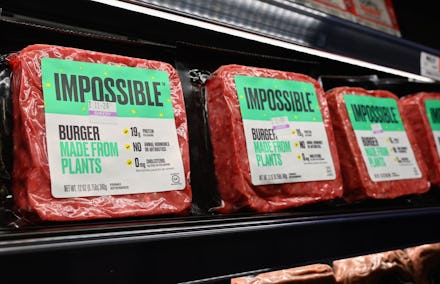Do we really need our plant-based meat to bleed?

In my decades as a vegetarian, I have seen many plant-based meat trends come and go. I am generally stoked about whatever sizzling, meat-impersonating product hits the market because not only does it give me, personally, more dining options, it also signals the mainstreaming of vegetarianism. Win-win. But now it turns out that the “heme” that makes the famously “bloody” Impossible Burger bleed may not be good for you, and I am starting to wonder why we need our fake meat to seem so realistically dead.
A lawsuit was filed last week that challenges the FDA’s 2019 approval of soy leghemoglobin — a.k.a. “heme,” the colorant used in Impossible Burgers that gives them their bleeds-when-you-cook-it functionality and medium rare appearance — was premature. The suit, which was filed by the Center for Food Safety, alleges that the FDA did not do enough testing before approving the additive and that there could be negative long term effects when humans digest it — namely cancer and reproductive issues, CBS reported. Their assertions are based on rodent studies, so while we can’t directly correlate that to humans, it’s obviously worth further investigation.
“A number of potential adverse effects were detected in a short-term rat trial: disruption of reproductive cycles and reduced uterine weights in females and biomarkers of anemia, reduced clotting ability and kidney problems,” Bill Freese, science policy analyst at the Center for Food Safety, stated in the filing documents.
Does no one see the dark satire in testing potentially dangerous substances on animals for the purpose of creating the meat alternatives we are ostensibly making to save animals?
Part of the problem, though, according to Freese, is not that the FDA tested the additive on animals previously, but that it hasn’t done enough testing, overall. The FDA, he said, “conducted none of the long-term animal studies that are needed to determine whether or not it harms human health.” The irony here is killing me. Or rather, the irony here is that our quest for an uncannily dead cow is killing rats.
Most of us have suspected that these genetically modified and lab-grown meat substitutes aren’t actually healthy for a while; there’s a lot of salt that goes into making faux meat taste just like a burger. The pandemic has a lot of people rethinking their diets and going more plant-based in light of the horrific outbreaks we’ve seen in meat processing plants. If we can expand our thinking that far, can we also reconsider the trend of obsessive animal mimicry in faux meat?
I’m pretty sure I’m not alone when I say that a bloodless Impossible Burger would have been fine by me, if it was delicious. I am a vegetarian because I don’t want to eat dead things, and I would happily return to the classic bacon scented cardboard that used to pass for fake meat if it meant that no animals were actually harmed in the making of my dinner.